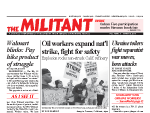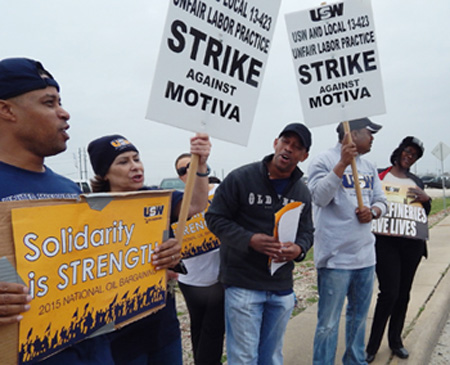PORT ARTHUR, Texas — The United Steelworkers union rejected the oil bosses’ latest concession contract Feb. 20 and moved to expand the national oil strike to four new facilities in Texas and Louisiana.
Two days earlier, a large explosion ripped through the Exxon Mobil refinery in Torrance, California, injuring four workers and spewing ash and debris over surrounding neighborhoods, underlining the issue of refinery safety the strikers are putting at the center of their fight.
Hundreds of oil workers rallied outside the Motiva refinery here Feb. 21 as they joined the nationwide strike, which began Feb. 1 and now involves nearly 6,600 workers at 15 petrochemical installations in seven states, including 12 refineries. The refinery here is the largest in the U.S., and, like the other three newly struck installations, is a joint venture between Shell Oil and Saudi Aramco. Shell is leading the negotiations with the union for the oil bosses on the industry-pattern contract.
“We don’t want to lose what our grandfathers fought for with their blood over the last 75 years,” Brian Strohm, a lead operator at Motiva’s hydrocracker unit, told the Militant. “We make good money, but the company makes billions at the expense of the worker. Business decisions are based on money not safety.”
The national strike, the first since 1980, now involves refineries that account for 19 percent of U.S. oil-producing capacity. All but one of the refineries are continuing some production, carried out by management and contractors. Union-organized plants not yet on strike continue to work on 24-hour contract extensions.
“Management continues to refuse to consider any process or proposal that would promote a safer workplace with better trained workers and less fatigue,” says The Oil Strike, a union bulletin dated Feb. 22. “The industry refuses to address well-documented and widespread safety deficiencies. They reject our efforts to reduce excessive overtime. The company wants to continue to rely on contractors for daily maintenance, and they refuse to fill permanent vacancies in the units.”
While the union once organized workers of all trades and occupations in the refineries, bosses over past decades have eroded the industrial character of the union by hiring contractors — some organized by other unions and some nonunion — to do maintenance and other nonoperating jobs.
The Steelworkers union is pushing to win back many of those jobs. This is a key “sticking point,” Shell told the Wall Street Journal Feb. 22.
“The strike is all about safety,” Dave Martin, vice president of United Steelworkers Local 8-719 at Marathon Oil in Catlettsburg, Kentucky, told the Militant.
The local union had some 1,200 members in 1992, Martin said, but now has 429. Jobs have been slashed and some 400 contract workers now fill jobs the union used to organize, about half organized by the building trades and half nonunion. More and more work has been dumped on operators, Martin explained, and “they don’t staff for emergencies.”
There is massive overtime at the refinery. Operators usually work 10 eight-hour shifts in a row, then get one day off. Marathon wants to institute 12-hour days and require workers to be on standby on their days off. The bosses have succeeded in imposing these conditions on workers in most of the industry.
Torrance blast highlights safety fight
After the Torrance explosion, which caused the ground in the area to shake with the force of a small earthquake and badly damaged a 12-story 1,000-ton catalytic cracking unit, the California Division of Occupational Safety and Health ordered refinery bosses to shut down work inside the unit.Exxon Mobil played down the disaster. “The material is not expected to be hazardous to people or animals under the conditions it was released,” company spokesman Todd Spitler said. “However, it may cause irritation to the skin, eyes and throat.”
Unionists disagree. “The piece of equipment that blew up handles spent catalysts and flue gases. Our position is that it is harmful,” Dave Campbell, secretary-treasurer of USW Local 675, told the Militant in a phone interview.
At the Exxon Mobil refinery, which is not yet being struck, bosses have accumulated more than $100,000 in penalties for equipment and safety violations there over the last five years.
The refinery has a long history of explosions. In 1994, a gas explosion sent flames 40 feet into the air, injuring 28 people. A huge blast tore through the plant in 1988, killing one and injuring nine, leading to a criminal investigation against the company.
Solidarity building
In Catlettsburg, people stop and bring food. The USW local at nearby AK Steel is hosting a dinner for the strikers at their union hall. Other unions in the area have made money contributions. Teamster truck drivers and union rail workers have refused to cross the picket line, forcing bosses to take over getting shipments into the plant.“There hasn’t been a day when someone hasn’t stopped by,” striker Gene Patterson, 50, told the Militant. “I’ve always blown my horn and waved when I saw someone on strike in the past … but this has changed me. I’m going to join them now. I can’t wait to pay it forward.”
More than a dozen cars filled with Steelworkers members caravaned from the USW district hall in Gary, Indiana, Feb. 19 to striking Local 7-1’s hall in nearby Whiting to help hold down picket lines in the extremely cold weather.
The strikers have received messages of support from unionists in Bangladesh, Brazil, Colombia, France, Norway, Turkey, the United Kingdom and the IndustriALL Global Union, representing workers in mining, energy and manufacturing in 143 countries.
“Bangladeshi garment workers know all too well the tragic consequences when multinational companies put profit over the safety of workers’ lives,” wrote Mohammed Towhidur Rahman, president of the Bangladesh Apparels Workers Federation. “We lost thousands of our brothers and sisters in the tragic yet avoidable Tazreen factory fire and Rana Plaza garment factory collapse. Workplace accidents are avoidable if safety measures are put in place.”
Ned Measel in Catlettsburg, Kentucky; Bill Arth in Los Angeles; and Linda Avers in Whiting, Indiana, contributed to this article.
Related articles:
West Coast Dockworkers Push Back Boss Attacks
On the Picket Line
‘We see too many of these grade cross crashes’
Walmart blinks: Pay hike product of struggle
|
Printer-friendly version of this article |















